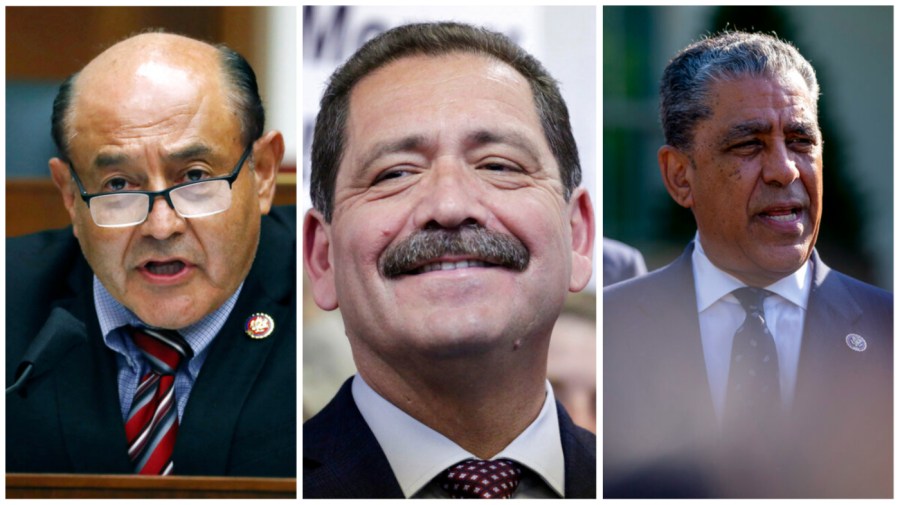
The Democratic House trio who became known as the “Three Amigos” for their defiant efforts to protect undocumented immigrants are now urging the Biden administration to use its executive powers to grant legal work permits for that group.
Reps. Jesús “Chuy” García (Ill.), Adriano Espaillat (N.Y.) and Lou Correa (Calif.) will deliver a letter Wednesday to President Biden, Homeland Security Secretary Alejandro Mayorkas and United States Citizenship and Immigration Services Director Ur Jaddou, outlining what they believe the administration can do on work permits, and why it’s in their best interest.
“Implementing such a policy would benefit workers nationwide. Legal work permits would further shield immigrants from exploitation and enable them to seek jobs that match their skills, thereby fostering better working conditions,” wrote the lawmakers.
“Additionally, granting work permits to long-term immigrant workers could increase annual tax revenue by an estimated $13.8 billion, according to the American Immigration Council.”
The Three Amigos and many immigrant advocacy organizations are concerned about the growing disparity between newly arrived migrants who are eligible for work permits in the short or medium term under parole programs or as part of an asylum application, and long-term undocumented immigrants who have lived and worked in the United States for years or decades without the possibility of applying for work papers.
Migration patterns in the Western Hemisphere shift continuously, but since 2019 the volume of migration, the origin countries of migrants and their mode of entry into the United States have changed radically.
The 10 million to 11 million people who make up the bulk of the undocumented population were in the United States before that change, most arrived either crossing the border undetected or overstaying visas, and they are not legally able to apply for work permits.
The most common country of origin for that group is Mexico, though large contingents of Salvadorans, Indians, Guatemalans and Hondurans are also included; the largest contingent of recent arrivals is originally from Venezuela.
Many of the asylum seekers and parolees who have come more recently — and who occupy a gray area between documented and undocumented — have applied for work permits, and the Biden administration has taken steps to make sure more people in that group are able to work rather than rely on social services.
“We commend your use of executive authority to expand work permit access for recent arrivals from various countries. However, we believe it’s time to extend this dignity to America’s longer-term immigrant communities, who have waited for relief for decades,” wrote the Democratic lawmakers.
The Three Amigos were joined in their letter by 11 advocacy organizations and 87 local elected officials.
The issue of work permits has taken special relevance at the local level, first as asylum seekers overwhelmed shelters and social services in major cities, and now as long-term immigrant communities have started to chafe over being left behind.
Local officials including New York Mayor Eric Adams (D) have at once been critical of the Biden administration for its border policies and openly supportive of work permit expansion.
In Chicago, tensions between long-term immigrants without work papers and new arrivals are simmering even as political leaders seek to onboard more workers to legally partake in a booming labor market.
Illinois Gov. JB Pritzker (D) last week called on President Biden to both expand Temporary Protected Status (TPS) eligibility to Venezuelans and find a way to grant Employment Authorization Documents (EADs) to long-term immigrants.
The Biden administration has made aggressive use of TPS, which allows for nationals of a designated country who are in the United States to remain and work legally while their home country is in crisis and remains designated.
On Tuesday, Sens. Dick Durbin (D-Ill.) and Alex Padilla (D-Calif.) hosted a briefing on Capitol Hill to tout the benefits of granting EADs to larger groups of undocumented immigrants.
And García is hosting a press conference to that effect Wednesday, showcasing the work of long-term undocumented immigrants and how work papers would improve working conditions, boost the economy and expand the tax base.
Groups such as the American Business Immigration Coalition have been pushing for EAD expansion for all potentially eligible populations, backing the political push with support from the business community.
The Three Amigos got that nickname for bucking Democrats, then in the majority, by pushing for immigration reform then threatening to derail key Biden administration legislation if it didn’t include key immigration provisions.
In their letter Wednesday, the legislators took a collaborative approach, asking the Biden administration to use existing authorities to expand EADs.
Their top request is expansion of a parole-in-place program that grants work permits to undocumented spouses and parents of military personnel. That executive power is not specifically codified for military use, which advocates say makes it available to grant papers to any undocumented immediate relatives of U.S. citizens.
The lawmakers also called for a work permit program for Dreamers — undocumented immigrants who were brought to the United States as minors — who are under 18 years old and do not qualify for Deferred Action for Childhood Arrivals.
And they are calling on the administration to use the president’s power to grant parole to foreign nationals — essentially clear their immigration record — to benefit long-term workers.
“These actions represent significant strides toward bolstering the U.S. economy and supporting immigrant communities that have long contributed to our society. Long-term undocumented immigrants are valued members of our communities, embodying the modern ‘American Dream’ through their dedication as workers, taxpayers, consumers, and entrepreneurs,” they wrote.
Copyright 2024 Nexstar Media Inc. All rights reserved. This material may not be published, broadcast, rewritten, or redistributed.














